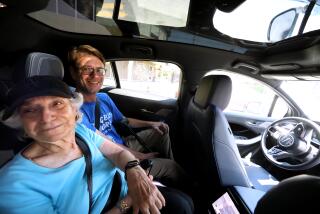Cell Phoners Are Driving Themselves to Distraction
- Share via
I can’t say for certain when I relegated cell phone users to a personal purgatory reserved for the Fox TV network and New York Yankee fans. But I have a suspicion it was the day that an SUV with a seating capacity equal to that of the Staples Center caused my life to flash before my eyes.
Until then, I’d operated under a principle of implied trust. Simply put, I naively assumed that, upon encountering a stop sign, other motorists would adhere to the instruction spelled out quite succinctly in four white letters boldly contrasted on an octagonal sea of red. Content to chat obliviously on a cellular phone as her truck bore down on me like a heat-seeking missile, the operator of the SUV failed to take into account the stop sign. At the last possible second, she spotted my lowly Chevrolet Malibu and, by the grace of God, we managed to swerve in different directions. Then, without apology or skipping a single word in her discourse, she went along her merry way leaving me to consider two imponderables: fate and the topic of the digitally enabled conversation that nearly transformed me into a National Highway Traffic Safety Administration statistic.
Collecting myself, I gave thought to giving chase and--assuming she noticed it--confronting Chatty Cathy at the next stop sign to pose the question that has crossed the mind of anyone who has ever had too close an encounter with cell phone users on the road, in restaurants and any and all other locales where the devices offend accepted standards of rectitude: What is so important?
The query, of course, is rhetorical. Nothing is that important. Yet each day, millions of Americans who lack the manual and cognitive dexterity necessary to simultaneously eat popcorn and flick a remote control risk life and limb--theirs and others--by indulging in dialogue while traveling at speeds upward of 70 mph in vehicles with tonnage exceeding that of PT boats.
Those who dare raise their voices in opposition to what they deem as unsafe behavior have been castigated as alarmists or, worse, Luddites, by digital devotees quick to point out that identical arguments about road diversion were raised when car radios first became an option.
Defending their position on another flank, mobilized cellular users contend that driving a car while speaking on a telephone is not inherently different from operating a motor vehicle while engaging in conversation with a traveling companion. There are, it goes without saying, a number of differences, not the least being that, unless the person occupying the so-called “death seat” requires the assistance of a seeing-eye dog in the course of normal transportation, we can assume that he or she has the ability to articulate the two words--”LOOK OUT”--that can spell the difference between a close call and a lifetime dealing with the liability attorneys who offer their services on late-night cable.
While this is clearly a battle already lost, a small victory was won last week when Suffolk County, N.Y., banned the use of hand-held cell phones while driving. We alarmists also are able to draw some measure of comfort in the findings of competent mental health professionals who postulate that the need for constant human contact, even in the sanctity of one’s automobile, speaks to not only deep-seated insecurity but also, horror of horrors, self-loathing. Coming soon: Dr. Drew weighs in on the relationship between digital wireless service and the breast-fed infant.
Personally, I’m waiting for the day--and it can’t be that far off--when an inventor with entirely too much time on his or her hands develops a remote control gadget designed to either jam the offending cell phone or, the best revenge, beam “Celine Dion’s Greatest Hits” into the earpiece.
Until such a device hits the market, though, I’ll continue to indulge my passive-aggresiveness by using my car horn to annoy the cellular hordes who manage to annoy me. Also, to prevent another run-in (near or otherwise) with a diverted SUV operator, I’ll continue to be ultra-aware each time my travels take me through an intersection, a preventive measure intended to prevent 911 from being a wayward mobile caller’s next call.
More to Read
The complete guide to home viewing
Get Screen Gab for everything about the TV shows and streaming movies everyone’s talking about.
You may occasionally receive promotional content from the Los Angeles Times.






